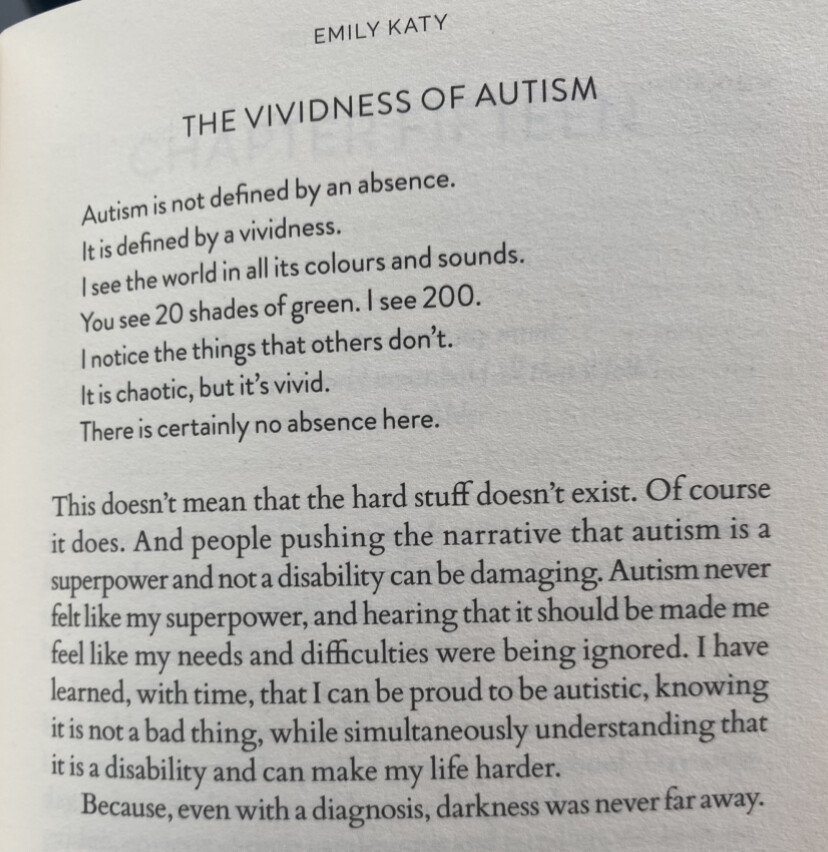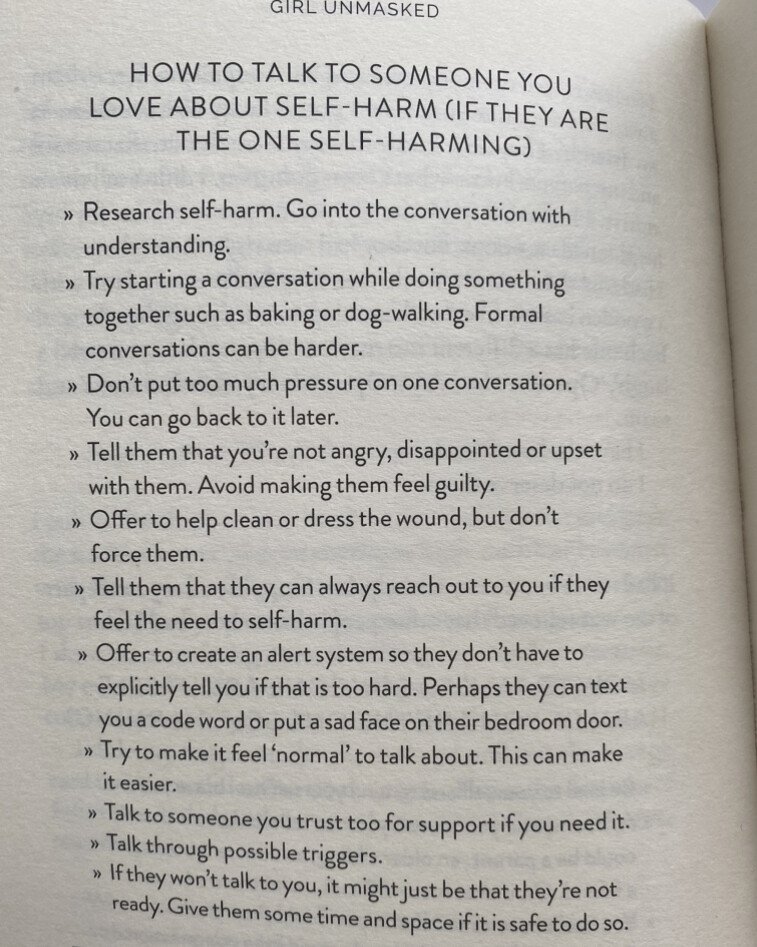How being neurodivergent affects mental health - and how to help
Please note: this article talks about topics including being detained in hospital under the Mental Health Act, self-harm, and suicide - but these conversations might save someone's life.
Being neurodivergent is not a bad thing. You do not need to be fixed, and you are not 'mentally unwell' - just different.
However, living in a world that is catered to one style of thinking and standards (think: A's in GCSEs), can be extremely stressful for those of us who can't comply.
When I worked in law, I spent a lot of time working on the review of the Mental Health Act, which was passed in 1983 - over 41 years ago. The result was a Bill, which among other important changes, would have stopped people like Emily Katy being detained under the Act for being autistic, for this reason - because they are not ill. You can't be 'treated' for being Autistic. Inexplicably, this bill was recently dropped by the Government, after 7 years of work.
We are currently living in a society that locks people up who think differently in the name of 'mental health'.
Over 2000 autistic people and people with learning disabilities are in inpatient mental health hospitals in England. The average length of stay is 5 years.
22 year old Emily is now a mental health nurse for children with ADHD. Her book, 'Girl Unmasked', explains her experiences of growing up with undiagnosed autism in one of the most intelligent, relatable, and heartbreaking ways I have ever read.
As an ADHD Coach, I've lost count of how many parents and children I've spoken to who's experiences mirror Emily's (and mine). Symptoms that were not picked up because we were not disruptive to others, but only ourselves, suffering in silence, until we popped under pressure. Mental health crises that nobody should have to experience - from self-harm, to suicidal ideation, to internalising all of the external shame of not being 'normal' as a constant narrative of daily self-hatred.
As our media blames parents for their children refusing to attend school, and the people seeking assessments as 'making it all up', Emily's story couldn't have come at a more important time, joining these dots in an incredibly coherent way. Books like these change the world, because they make something that seem so complicated, so obvious.
The sheer normality of Emily's early experiences and loving nature of her family will help validate thousands of parents' experiences who question the causes of why their children are struggling, especially in relation to neurodiversity.
They will see their own experiences mirrored back at them, in finding out along with their child that they have been living with a neurodevelopmental condition all of their life, which nobody knew about. I hope they will find solace in the fact that there is no right or wrong way to react to this news, but simply acceptance.
It is not their fault, and it is not your fault. People who are neurodivergent are not the problem: our society is.
Girl Unmasked, Emily Katy
Whenever I speak to parents of neurodivergent children, I always tell them how in awe I am at the fact that they care. Many do not. Many refuse to accept that their children are struggling and deny them the support they may even ask outright for. The fact you are reading this means you care a lot more than many others out there - you are trying to understand.
It would be much easier to write their struggles off as them being 'dramatic' instead of advocating and fighting for them to live in a better world. It's vulnerable and scary to stand with them, believe them, and to be there for them.
Emily's book reflects many people's experiences of being neurodivergent. Right from being bullied, where other children seem to implicitly know we are 'weird', and to be unable to understand why. To always feel left out and as though we are too late catching up.
To throwing ourselves into the standards where it is clear what's expected of us, like exams, but not to know where to stop, and burning out. To masking our symptoms by studying the world around us like a script, without realising that this isn't 'normal', but understanding that we are not, and this is a thing to hide.
'As I listen, I consider how overwhelming things can get for me and I wonder how overwhelming it must be for those with autism, like my cousin. If I find noise difficult, it must be so much worse for them.' Emily Katy at her school's presentation on Autism
This book shows the scaffolding that goes into masking, and how much energy that takes. The construction of escapism, like hyper-focus or special-interest binges, imaginary worlds, dissociation, or running away. It is not a conscious decision, but a survival strategy: to constantly be in a state of fight or flight mode. To feel like an alien in a human body, waiting to be found out.
Then it shows what happens when significant changes happen, such as death, and this scaffolding falls apart. When we learn to cope in environment A with a spaghetti tower of construction holding us up, there is no option B: everything crashes.
This is where the invisible may become visible, as we struggle to keep this hidden. OCD, panic attacks, self-harming, running away, suicide attempts. There is no 'reason' for it, other than as a way to cope. Behaviours and ways of thinking that can't be 'cured' with an anti-anxiety or anti-depression tablet, because it fundamentally stems from being neurodivergent, which is not something to be 'fixed', in and of itself.
This is the other side of the coin, what lies behind the 'superpower' narrative of being neurodivergent. This is the only side of the coin I ever knew until I found out I had ADHD. Emily has written lists of 'how to help' unique to every one of these experiences that will help so many people navigating these unimaginable realities.
This book shows the real life failings of our healthcare system. How inaccessible CAMHS was to Emily and her parents, despite months on a waiting list, and how neurotypical 'solutions' like CBT did nothing to help. How many missed opportunities there were for someone to recognise Emily's obvious signals of being Autistic, and how many times she was failed, bringing to life the reality that so many people are experiencing on a daily basis.
Parents are not seeking out assessments for their children for fun, or because they want them to get more time in exams. This book shows you how impossible it is to access any kind of help at all, let alone an assessment for a neurodevelopmental condition.
Then it shows you the direct result of these failings: suicide attempts. There's a 5 times higher risk of suicide for those with ADHD, and 7 times higher for autistic people. 1 in 4 women with ADHD has attempted to take their own life. These are distressing conversations to have, but they are absolutely vital - someone dies from suicide every 40 seconds.
For every single parent out there that cannot fathom how their beautiful children could possibly think about taking their own life, you need to read this book. It shows you how these are not controllable thoughts. They are not rational. They are not because you, or they, have done anything wrong.
Then comes the hospitalisation. The quite literal detention. The inhumane treatment of being watched by strangers in a place where you are supposed to 'heal'. The being trapped somewhere against your will.
I was recently on holiday and had to explain ADHD to someone who'd never heard of it. I asked them to imagine the zebras outside being trapped in stables in the UK, expected to carry humans on their backs like horses. There's a reason that some animals are domesticated and some are not.
Our society has a label for those who suffer so much to meet these 'normal' standards that they can be diagnosed under a 'deficit' model. However, it's NOT normal for human beings to have so much pressure placed upon them. To be looking into screens for hours a day. To have no friends, but thousands of followers.
We all experienced a traumatic and significant shift with the Covid pandemic. It's easy to remember it as baking bread and online quizzes, but the reality is that we all experienced inconsistent periods of extreme social isolation, which would have impacted all of our development - especially for children. We all entered lockdowns without knowing when or if we would be able to go outside again, with daily number of deaths broadcast on the news. In the UK, we all discovered that the very people responsible for the rules had broken them in a variety of the most disrespectful ways possible.
Is it any wonder that children don't want to go to school, where they are expected to meet standards that haven't been adjusted to reflect the delay in their education? That adults don't want to return to working from offices, and commuting hours a day, when they don't need to? The pandemic showed that a 'one size fits all' approach is not necessary for our society to function, so why should we all get back in a box?
The only way forward for us as a society is inclusion and accessibility for everybody. Institutions must adapt to reflect the reality of a variety of different ways of thinking, especially schools. Instead of conditioning children to tie their worth to exam results and standardised ways of thinking, schools can teach children how to understand, and accept, themselves and others.
Right now, we're seeing the opposite. We're seeing a Government that's screaming louder and louder, threatening fines and disability cuts and cutting off access to support. For example, in some parts of the UK, people are unable to access any assessments for ADHD or Autism unless they are at 'crisis' point, such as their life being endangered.
This will not work: all it will do is drive people to this crisis point, like Emily.
Yesterday I was asked on the radio how people can help those with ADHD. Here's what I said:
'Be nice. Be human. Understand that all of us, whether we have ADHD or not, we're all struggling in our own ways and we all think differently from one another.
Be understanding and empathetic, remembering that not everyone sees things in the same way that you do. Try your best to have compassion for people and think, 'just because I can do something in this way, doesn't mean everyone else can'. Believe people when they ask for help, and just being kind. Notice if someone's struggling, check in on your friends and family, and ask how you can help them, making the extra effort.
It sounds so simple because it actually is.
This is what's so frustrating about stigmatising conversations in our society about people 'making it up to access help', but shouldn't people deserve help anyway?
Within schools and the workplace making adjustments that can help 1 individual can help everyone... so just being open, curious, collaborative, and trusting people.
It can be scary to have these conversations, especially if you don't understand ADHD and don't know how to relate to them, but it's okay not to have all of the answers. It's okay to just tell them that you're there for them, and that goes a really long way.'
At the end of the day, kindness is all we have.
Read Emily's book, 'Girl Unmasked', here (released 28 March)
Read my book, 'the Reality Manifesto' here (a book on mental health, social media and body image I wrote for children and parents).



